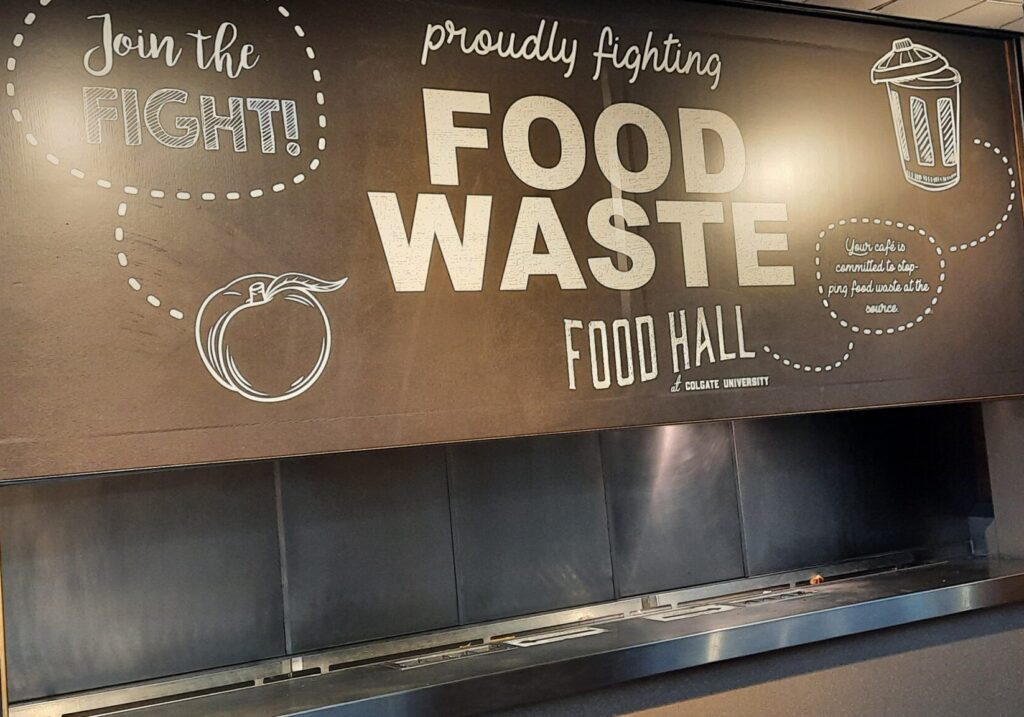Colgate University: A Commitment to Sustainability
Nestled in a rural village in upstate New York, Colgate University is a private liberal arts college steeped in history, lore, and a community of accomplished alumni, including journalist Chris Hedges, Ben Cohen of Ben & Jerry’s, and political journalist Gloria Borger. Despite its storied past, Colgate is also a forward-thinking institution embracing sustainability in a big way.
Breaking the “All or Nothing” Mindset
During a recent visit to Colgate, I had the privilege of speaking with students in the Environmental Studies program. The question I sought to answer was simple: does Colgate University compost? The reality, however, is more nuanced, as composting is part of a broader effort to reduce waste and promote sustainability.
Partnering for change
Julia Sparks, Coordinator for the Environmental Studies Program and Assistant Director of Sustainability, invited me to present at the school’s “Brown Bag Seminar Series.” I shared insights about CET’s Rethink Food Waste New York program, a partnership with the New York State Department of Environmental Conservation. This initiative provides technical assistance to businesses and institutions to reduce food waste, aligning with New York State’s Food Donation and Food Scrap Recycling Law enacted in 2022.
This law requires businesses and institutions that generate an average of 2 tons of wasted food per week to:
- Recycle all remaining food scraps if within 25 miles of an organics recycler, such as a composting facility or anaerobic digester.
- Donate excess edible food.
Leaders in Action
Julia collaborates closely with John Pumilio, Colgate’s Director of Sustainability. Since 2009, John has spearheaded the University’s transition toward sustainable practices, implementing initiatives like composting and other impactful measures. Thanks to these efforts, Colgate has reduced its carbon footprint by an impressive 46% in just 10 years.

Digging into Colgate’s Composting Legacy
Colgate University, nestled in upstate New York, has a long and complex history of implementing composting on campus. Through its ongoing efforts, the University demonstrates how persistence and creativity can overcome challenges in sustainability initiatives.
One standout example is the “Hot Compost” event held in 2020, blending art, permaculture, and environmental activism to inspire change. Earlier student-led efforts to collect food scraps and divert them from landfills laid the foundation for today’s composting system. Although operational challenges arose—such as odors and wildlife interference—students established the right mechanics, proving the viability of on-campus composting.
Technical Solutions and Learning Opportunities
To handle large volumes of compost, the piles (or “windrows,” as large, long compost piles are often called) require a certain level of recipe development and pile management to reduce odors and to ensure we’re not setting up unintentional buffet feasts for the woodland creatures nearby. This means dialing in things like the carbon-to-nitrogen ratio (often abbreviated as C:N) and the percentage of moisture content, percentage solids, and bulk density (pounds/yd). If there are specific agricultural applications, it’s also important to look at the pH and soluble salts (mmhos/cm). All great learning opportunities for biology and chemistry students!
Aside from the obvious microbes performing valuable ecosystem services, perhaps the most critical piece of any functioning community-scale composting system is the people making the compost magic/science happen.
Beth Roy’s Composting Pilot Program
In 2013, Beth Roy joined Colgate as Community Garden Manager, bringing her expertise in psychology, biology, and horticultural therapy. Over nearly a decade, she has grown 4,000 pounds of produce annually for campus dining services, interfaith centers, and local food cupboards.
In 2022, Beth launched a composting pilot program targeting the Greek life community on Broad Street. With determination and resourcefulness, she secured a golf cart from the Athletics Department to collect food scraps from seven fraternities and sororities. A year later, the program has flourished, collecting over 4,000 pounds of food scraps and fertilizing Colgate’s Community Garden beds.

Looking Ahead with New Resources
One year later and this collaboration for the greater good between Beth Roy and Colgate University’s Sustainability Office has blossomed and is going strong. Five-gallon buckets of food scraps are now collected weekly and taken to the Community Garden, where they’re then used to fertilize the garden beds. “Campus houses and apartments with fewer residents can also be provided with a compost tumbler on site that is emptied as needed,” according to Colgate’s Waste Minimization and Recycling webpage. Colgate was also just awarded a grant to help purchase their own electric golf cart for the compost program. The funding is through the NYSAR3 and NYSP2I College Council grant program, and the University is excited about how this will help strengthen its composting efforts. To date, they’ve collected and composted over 4,000 lbs of food scraps since starting the program last spring.
Moving Beyond “All-or-Nothing” Thinking
Colgate’s journey underscores the importance of incremental change when tackling sustainability challenges. Rather than striving for perfection, the University has embraced a pragmatic approach, leveraging cross-departmental collaboration and community involvement. By engaging Greek life and other campus groups, Colgate is rewriting the sustainability playbook, showing that meaningful progress often comes from collective action.
“Earth knows no desolation. She smells regeneration in the moist breath of decay.” – George Meredith
A Blueprint for Other Institutions
Colgate University’s composting story offers inspiration and practical lessons for institutions looking to reduce waste and embrace sustainability. As part of the Rethink Food Waste NY program, funded by the New York State Department of Environmental Conservation (DEC) and delivered by CET (formerly The Center for Ecothecnology) these efforts demonstrate how innovation and perseverance can lead to lasting environmental impact.

Lisa Pellegrino
Waste Reduction Consultant